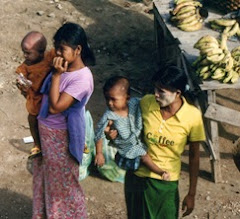In Indonesia, any woman over 30 is called “Ibu” (mother), whether or not she has children. At the losmen (guest house) where I stayed in Bali in the mid-80’s, the Supreme Ibu was a grandmother, about 55 years old, whose worn, creased face showed many signs of being 70, but whose sleek, trim body could vie with that of a 35-year-old. And while she was definitely of the “old world”, Ibu was also “naturally” hip.
Like many others, she effortlessly nursed her own grandchild and taught me that, if a woman never stops giving breast milk, she never dries up. In Bali, the women all wet-nursed each other’s babies, so they were always able to take over for another mother. Bali in the 80's was still one big “happy” family, everyone helping each other out. They, of course, had their in-fighting and gossipy back-biting, but when “push come to shove”, as they say, they could count on one another.
Ibu would daily parade through the courtyard of the losmen where I stayed–the bright red hibiscus and vibrant yellow allamanda gracing her path–moving swiftly with a 10-gallon jug of water carefully balanced on her head. Her tiny body, wrapped in the traditional batik sarong, could be on the cover of Vogue, her half toothless smile in National Geographic.
An old terry cloth towel acted as head-padding for the water container, and Ibu carried it all with the practiced grace of a young ballerina, the toe shoes replaced by flip-flops. Her thinly rubber-soled slippers clippety/clopped along the concrete path of the garden area, where freshly-washed clothes hung over low bushes and around the lawn, looking like sheets tossed over furniture in an old, unused mansion.
(Read “freshly” as “recently”. The woman laundered clothes for themselves and the losmen guests in the rivulets that ran throughout the village, concrete conduits branching from the big, black river running through the center of town. The river itself was pretty polluted, and men and women pee-d in the rivulets all the time. But the ladies worked tirelessly to get the clothes clean. They were dried in the garden under a stifling sun, the garbage of the river burned from their threads, producing, at least, a clean, fresh smell.)
Ibu, while scurrying to the kitchen, could even turn towards you and wink as she strode along her way, as though she were carrying a helpless kitten, rather than a veritable “ton”of water.
She rarely spoke because Ibu didn’t know much English, but she understood almost everything anyone said. I was in Bali for the second of three summers, and I had started to “study” Indonesian, taking daily lessons from Ibu’s son, Wayan, who taught English in the high school.
But, although Ibu hardly uttered a word, her sense of humor was always silently alive, twinkling in the black Balinese eyes and the wide, marvelous smile that couldn’t help but grab your attention. When she laughed, it came out as a kind of cackle and
usually continued longer than warranted. She would throw her head back, covering her mouth with a bony brown hand, and giggle on and on. She was constantly enjoying herself.
And she was always trying to help me learn Indonesian.
Every morning, shortly after I awakened, I would sit on the balcony outside my small quarters in the two-room bungalow. The patio was large, about 20 x 16 feet. Its floor was a dark red tile. One solid wall–the others were open–was adorned with a large, terrible oil painting by Ibu’s son. Wayan was extremely proud of his “artistic” accomplishment, a typical Balinese-style canvas, depicting dozens of tangled bodies, a few waterfalls and, at least, one grove of banana trees. The proportions of the bodies were, to put it kindly, “slightly” off...unless you know someone whose arms are twice as big as their legs. I told Wayan I thought he’d truly captured the flow of the waterfall.
The balcony was really the center of life at the losmen. Every bungalow–there were six–had two rooms, each leading onto the balcony. In the a.m., my bungalow mate and I would rub the sleep from our eyes as we yawned and chatted for several minutes before Ibu came to ask what we wanted for breakfast. I usually ordered a banana pancake.
One day, when she brought the tray—the “usual” fruit salad of papaya, banana, pineapple and grated coconut, topped with a few shiny “blobs”of palm sugar; the pancake; and a large mug of Bali’s fabulous coffee—I pointed to the banana and said:
“Ibu…ini pisang (This is a banana).” Then I pointed to the pancake and asked, “Apa ini?” (What’s this? Or, How do I say “pancake”?)
Ibu moved up close to me and put her serious face within inches of mine. She pursed her lips, then stopped to make sure I was watching her carefully, her dark eyes staring, beseeching me to pay rapt attention. She raised her hand and, like a symphony conductor, moved it up and down, emphasizing her words, as she said, very slowly: “PAAAN…CAKE.”
Finally, she tossed her head of jet black hair, giggled like a three-year-old and went back to the kitchen. Throughout the morning, whenever she saw me, Ibu burst into fits of laughter.
And to this day, I don’t know how to say “pancake” in Indonesian.
Thursday, September 6, 2007
Subscribe to:
Posts (Atom)
